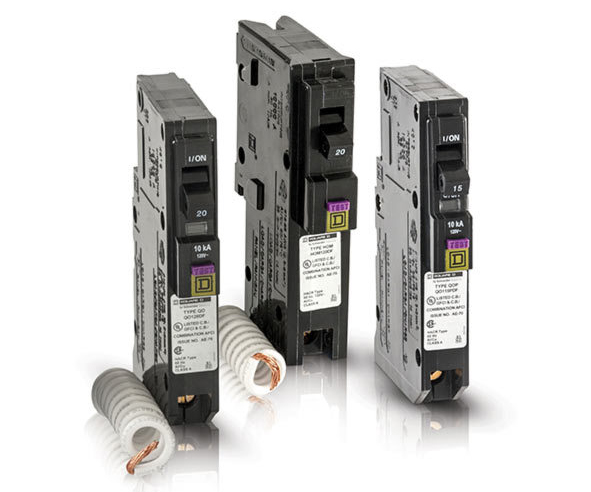What are AFCI Breakers?
What are Arc Fault Circuit Interrupter (AFCI) breakers and why do I need them?
Standard circuit breakers use a combination of thermal and magnetic sensors to detect and turn off a circuit when an overload condition is detected. The thermal sensor detects overloaded circuits that are drawing too much power over a period of time, like if you run your coffee maker and microwave on the same circuit simultaneously. The magnetic sensor detects short circuits, where a wire or appliance is damaged and the current is rushing through the wires as fast as possible. The magnetic sensor will shut the breaker off in a fraction of a second. But, sometimes conditions in a home, like long distances or small gauge conductors, will slow the reaction time and a fire may start before the breaker trips.
AFCI breakers add another level of protection with the addition of a microprocessor that looks for fire-causing arc “signatures” traveling through the wire with the goal of shutting the circuit down before a fire has time to start.
Back in 1999 when AFCI technology was first developed the National Electrical Code started requiring AFCI protection for bedrooms. As AFCI technology matured, and its reliability proven, requirements for its use have expanded to nearly every room of the home. Pennsylvania’s Department of Labor and Industry building code currently adopts NFPA 70-2017 (Commonly known as the 2017 NEC), which states “210.12 (A) Dwelling Units. All 120-volt, single-phase, 15- and 20-ampere branch circuits supplying outlets or devices installed in dwelling unit kitchens, family rooms, dining rooms, living rooms, parlors, libraries, dens, bedrooms, sunrooms, recreation rooms, closets, hallways, laundry areas, or similar rooms or areas shall be protected by any of the means described in 210.12(A)(1) through (6)” (Additional information is provided in the 2017 NEC).
Or, to paraphrase in the reverse: All 120 volt branch circuits except those located in bathrooms, garages, and unfinished areas in homes are required to have AFCI protection. While existing homes are grandfathered in, whenever we alter the equipment we are required to install it according to current electrical code.
If you don’t need your panel replaced, but still want AFCI breakers installed, give us a call! We can install them in all the major panel brands in use in homes today.
